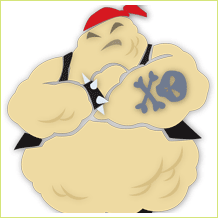What are trans fats?
a. Fat formed when food manufacturers turn liquid oils into solid fats
b. Fat found naturally in some animal-based foods
c. Fat found in fish oils
d. Both a and b
e. All of the above
b. Fat found naturally in some animal-based foods
c. Fat found in fish oils
d. Both a and b
e. All of the above
Answer
d. Both a and b. Most trans fats are created when food manufacturers add hydrogen to vegetable oils, a process called hydrogenation. Because they help foods stay fresh and retain their flavor, trans fats have been a popular addition to packaged foods for decades. A small amount of trans fats is found naturally in animal-based foods, but these natural trans fats are not believed to be as harmful as artificial ones.
Why are trans fats considered harmful?
a. They raise your "bad" cholesterol.
b. They lower your "good" cholesterol.
c. They raise your "bad" cholesterol and lower your "good" cholesterol.
d. They contribute to osteoporosis.
e. They can cause asthma.
b. They lower your "good" cholesterol.
c. They raise your "bad" cholesterol and lower your "good" cholesterol.
d. They contribute to osteoporosis.
e. They can cause asthma.
Answer
c. They raise your "bad" cholesterol and lower your "good" cholesterol. Trans fats, when they first started to be used, were thought to be better than saturated fats (found in beef, cheese, and butter). That's because trans fats are created from unsaturated, plant-based oils. But in recent years, scientists discovered that trans fats increase levels of LDL "bad" cholesterol and lower levels of HDL "good" cholesterol, which protects against heart disease. Both trans fats and saturated fats contribute to heart disease. While saturated fats increase "bad" cholesterol, they don't affect "good" cholesterol.
Which of the following foods does NOT contain trans fats?
a. Restaurant French fries
b. Doughnuts
c. Olive oil
d. Frosting
e. Stick margarine
b. Doughnuts
c. Olive oil
d. Frosting
e. Stick margarine
Answer
c. Olive oil. Monounsaturated fats, such as olive oil, and polyunsaturated fats do not raise "bad" cholesterol and have health benefits when eaten in moderation. These fats also include canola, peanut, sunflower, and corn oil. And while not all French fries, doughnuts, frostings, and stick margarines contain trans fats, many do. Check food labels for trans fats and, when at restaurants or bakeries, ask if foods are prepared with trans fats.
What is the American Heart Association's recommendation for daily intake of artificial trans fats?
a. 0 grams
b. 1 gram
c. 2 grams
d. 5 grams
e. 10 grams
b. 1 gram
c. 2 grams
d. 5 grams
e. 10 grams
Answer
a. 0 grams. The American Heart Association (AHA) recommends that no more than 1 percent of your total daily calories come from trans fats. (For a 2,000-calorie diet, that's 20 calories.) But since most of us eat about 20 calories in natural trans fats from animal products, there are no calories left for food with artificial trans fats.
True or false? If a food label says the product contains zero grams of trans fat, there is never any trans fat in the food.
a. True
b. False
b. False
Answer
b. False. If there are less than 0.5 grams of trans fat in a serving of a product, the nutrition label says that there is no trans fat in the product. But if you eat several servings, you could eat more trans fat than is recommended by the AHA. Check food labels for the following ingredients: partially hydrogenated soybean oil, partially hydrogenated oils, or shortening.
A 2007 study found that women with the highest level of trans fat in their blood had __ times the risk of heart disease than those with the lowest levels.
a. Two
b. Three
c. Four
d. Five
e. No difference was found.
b. Three
c. Four
d. Five
e. No difference was found.
Answer
b. Three. This Harvard school of Public Health study tested the blood of 32,826 participants.





